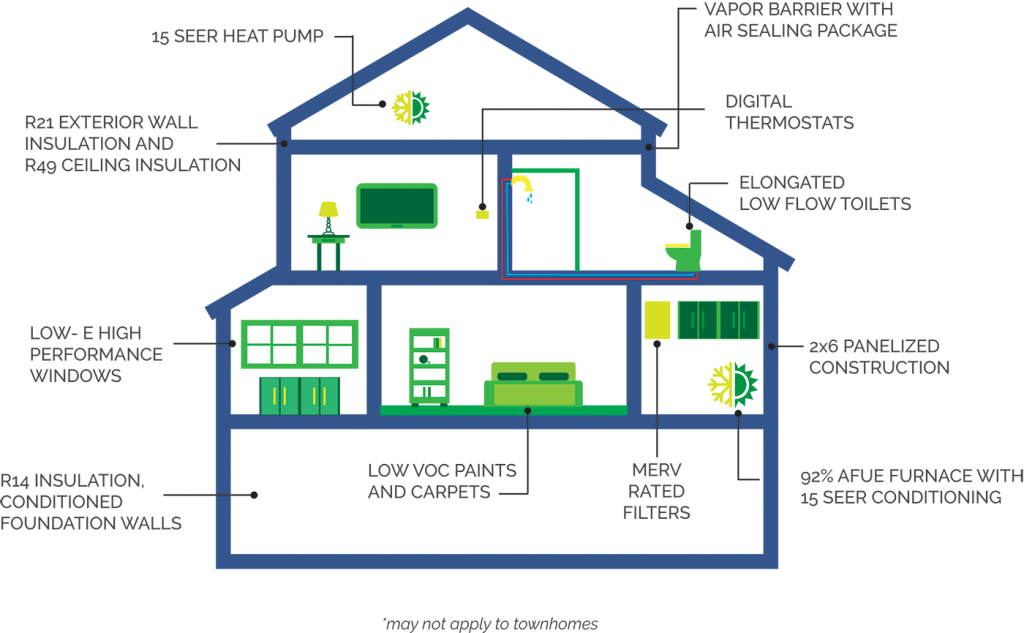Blitz News Digest
Stay updated with the latest trends and insights.
Energy-Efficient Homes: Where Comfort Meets Conservation
Discover how energy-efficient homes blend comfort and conservation, saving you money while enhancing your living experience. Dive in now!
10 Essential Features of Energy-Efficient Homes You Need to Know
When considering energy-efficient homes, there are several key features that stand out for homeowners looking to reduce their environmental impact and energy costs. Here are 10 essential features you should know:
- High-Quality Insulation: Proper insulation helps maintain a consistent indoor temperature while reducing heating and cooling costs.
- Energy-Efficient Windows: Double or triple-glazed windows minimize heat loss and improve comfort.
- Smart Thermostats: These devices optimize heating and cooling schedules, allowing homeowners to save energy without sacrificing comfort.
- Energy Star Appliances: Choosing appliances that meet strict efficiency guidelines can significantly reduce energy consumption.
- Renewable Energy Sources: Installing solar panels or wind turbines can greatly enhance a home's sustainability.
In addition to the fundamental features listed above, there are several other aspects to consider when designing energy-efficient homes:
- Efficient Lighting: Switching to LED lighting can lower energy usage significantly.
- Water Conservation Systems: Low-flow fixtures and smart irrigation systems contribute to reduced water and energy usage.
- Mindful Landscaping: Strategically planting trees and shrubs can provide natural cooling and windbreaks, reducing energy consumption.
- Quality HVAC Systems: Energy-efficient heating, ventilation, and air conditioning units are key to optimal home energy performance.
- Home Energy Audits: Regular assessments can help identify areas for improvement and lead to greater efficiency.

How to Create a Comfortable Living Space While Conserving Energy
Creating a comfortable living space while conserving energy is not only beneficial for your utility bills but also for the environment. Start by optimizing your home’s insulation, which can significantly reduce the need for heating and cooling. Consider adding weather stripping to doors and windows, using energy-efficient curtains to minimize heat loss, and sealing any gaps that may allow drafts. Additionally, using a programmable thermostat allows you to customize your heating and cooling schedule, ensuring that energy is not wasted when you’re not home.
Another effective way to enhance your living space is through smart lighting solutions. By incorporating LED bulbs, you can enjoy comfortable illumination with lower energy consumption. Furthermore, using natural light to your advantage can create a warm atmosphere; open your curtains during the day to let sunlight in. Consider utilizing energy-efficient appliances that promote sustainability while providing comfort, such as refrigerators, washers, and dryers that have good energy ratings, which ultimately contributes to a more eco-friendly home.
What Are the Benefits of Energy-Efficient Homes for Homeowners?
Energy-efficient homes provide a multitude of benefits for homeowners, ranging from financial savings to enhanced comfort. By investing in energy-efficient upgrades, such as better insulation, energy-efficient windows, and modern appliances, homeowners can significantly reduce their energy bills. In fact, according to the U.S. Department of Energy, these upgrades can lead to savings of up to 30% on monthly utility costs. Moreover, energy-efficient homes are often equipped with smart technology, which not only optimizes energy use but also allows homeowners to monitor and control their energy consumption, leading to even greater savings over time.
Additionally, energy-efficient homes are often more environmentally friendly, contributing to reduced carbon footprints. Homeowners can take pride in knowing that their choices are making a positive impact on the planet. Energy-efficient buildings typically use fewer resources, which can lessen the strain on local utilities. Furthermore, homes built with energy efficiency in mind tend to have higher resale values, as more buyers are prioritizing sustainability in their home searches. Overall, the benefits of owning an energy-efficient home go beyond just savings; they encompass a healthier lifestyle, increased property value, and a commitment to sustainability.